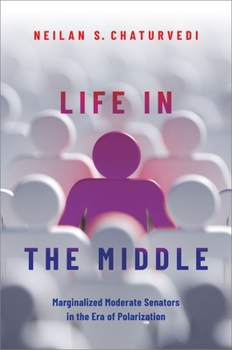Life in the Middle: Marginalized Moderate Senators in the Era of Polarization
Select Format
Select Condition 
Book Overview
A long-held belief of political scientists is that moderate voices in the Senate act as power brokers between the ideological poles, yet year after year we see partisan gridlock in Congress. Some even argue that the shrinking number of moderates only increases their political influence. In Life in the Middle, Neilan S. Chaturvedi argues that the belief in the powerful, pivotal moderate neglects their electoral circumstances and overestimates their legislative power. In other words, not all Senators are elected under equal circumstances. Chaturvedi posits that, unlike their ideological counterparts who are elected from states that share an ideological identity, moderates are elected from one of two constituencies: states that have a partisan lean to one party but have enough "swing voters" to vote in a moderate from the opposite party, or states that are nearly evenly divided in terms of partisanship. Using unique interview data with legislative directors, retired United States Senators, and data compiled from the Congressional Record, Chaturvedi shows that, because of their precarious electoral circumstances, moderate senators must avoid active participation on bills and pushing controversial legislation. Lawmaking is much more variable and less moderating than previous theories assumed, as the process relies less on the work of moderates and more on party leaders. The book also demonstrates that mainstream concerns about polarization and its negative effects of increased gridlock and ideological legislation are true.
Format:Paperback
Language:English
ISBN:0197599737
ISBN13:9780197599730
Release Date:October 2021
Publisher:Oxford University Press
Length:224 Pages
Weight:0.75 lbs.
Dimensions:0.6" x 6.2" x 9.6"
Customer Reviews
0 rating





